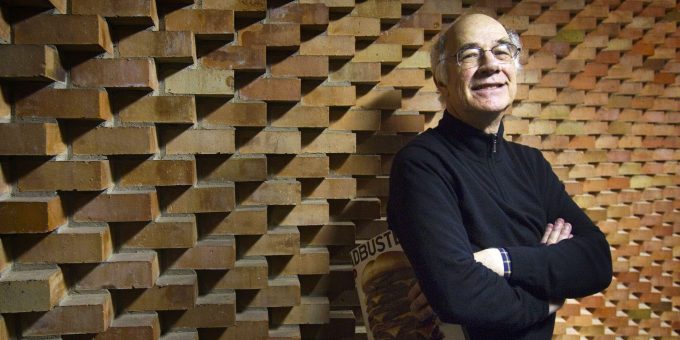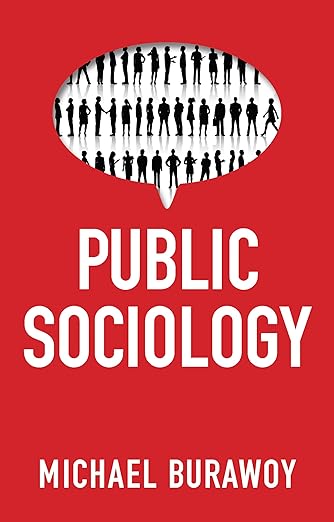
Michael Burawoy. Image via news.iu.edu.
Michael Burawoy: An Absolute Gem
“Dr Burawoy was one of the few senior sociologists who stood unequivocally against the genocide. He did so loudly and eloquently, never declining a request to speak or write on the matter. What an absolute gem of a human.” – Eman Abdelhadi, posted on X
Professor Michael Burawoy, our beloved colleague, mentor, and friend, passed away on February 3, 2025, in Oakland. He retired from the University of California-Berkeley, where he taught for 47 years, in 2023.
Burawoy published 12 books and more than 120 articles. He served in multiple leadership positions: Chair of the Berkeley Sociology Department (1996-1998, 2000-2002); President of the American Sociological Association (2003-2004); Vice President for National Associations of the International Sociological Association (2006-2010); and President of the International Sociological Association (2010-2014). He won many awards, including the W.E.B. Du Bois Career of Distinguished Scholarship Award from the American Sociological Association.
Michael Burawoy was a giant within the field of sociology. A path-breaking Marxist sociologist, he changed how we do sociology and how we think about the world. Lying beneath this revolutionary impact were the other sides of Burawoy: a brilliant teacher and mentor, a curious student, and a human with a deep commitment to a better and more just world.
Burawoy as Path-breaking Marxist Sociologist
Burawoy’s journey toward Marxism and sociology began in southern Africa in the late 1960s and early 1970s. He joined and wrote about campus protests at the University of Zambia, where he earned an MA degree. He observed the transformation of the Zambian copper mines after independence, culminating in his first book, The Colour of Class on the Copper Mines (1972). And he built on a burgeoning Marxist historiography of South Africa to theorize the relationships between racism, capitalism, and migration.
As a PhD student at the University of Chicago and then a faculty member at Berkeley, Burawoy turned to factory ethnographies, first in Chicago and later in Hungary. His groundbreaking study of the labor process, Manufacturing Consent (1979), revealed how games on the shop floor produced worker consent to their own exploitation. In The Politics of Production (1985), Burawoy would go on to contrast factory regimes across the globe. He showed that politics exist outside the state, within the factory, and, further, that the difference between capitalist and state socialist countries lay in different relationships between the factory and the state.
Burawoy devoted his life to sociology, and through his efforts to integrate Marxism into the discipline he became a renowned social theorist. He theorized a Marxist approach to the labor process, taught us how to develop a scientific Marxist research program, and pushed us to rethink and reconstruct the sociological canon. He developed innovative analyses of both the collapse of Soviet communism, and the marketization of the university. And he theorized how to unite Marxism and sociology, via what he called “Sociological Marxism.” Burawoy also developed an influential ethnographic methodology, “the extended case method,” which has transformed how many sociologists think about not just ethnography but research methods in general (see The Extended Case Method: Four Countries, Four Decades, Four Great Transformations, and One Theoretical Tradition, 2009).For Burawoy, a Marxism worth pursuing had to be engaged with the world, situated within a global perspective. During his term as President of the American Sociological Association, he advanced the idea of “public sociology,” a sociology that is deeply engaged with communities beyond the academy. This call prompted crucial debates within the discipline, and it continues to inspire sociologists across the world. As a leader within the International Sociological Association, Burawoy promoted a “global sociology” that sought to facilitate dialogue across national and hemispheric divide. Toward this end he founded the journal Global Dialogue, which lives on today and is published in 17 languages.
Burawoy as Teacher, Student, and Activist
What does it take to produce a revolutionary sociologist? What prompted and enabled Burawoy’s innovations? At the top of the list was surely his experience as a gifted teacher and mentor, which consistently informed his research. At Berkeley, Burawoy became famous for his undergraduate lectures in Social Theory, where he coaxed more than 200 students—he carefully learned each of their names—into deep discussion and critical thinking. Among graduate students, he chaired more than 80 dissertations and served on many more as a regular committee member.But his reach as a mentor was never limited to his formal students. Across the globe, he supported many scholars at various stages of career development. Burawoy’s brilliance as a teacher and mentor reflected his outstanding qualities as a person. He was both demanding and kind. He was patient. He was extremely generous with his time. And most importantly, he believed in others and their capacity to do great things. For his students, this unwavering support meant the world.
In part, Burawoy was a great teacher and mentor because he was also a student. Not in the formal sense, but rather in the sense that he was deeply curious about the world. He was eager to learn from his students and colleagues, and he consistently sought to incorporate new ideas into his repertoire. This is what brought him joy. And it held true, even as he was steadfast and transparent about his own strong opinions and commitments. For somebody with such monumental accomplishments, his modesty and humility were remarkable.
 Finally, there was Burawoy the activist. He was deeply committed to social justice, and he fought this battle on the terrain of sociology. This was the root of his interest in public sociology, and he always understood students as his most important public. In his last book, Public Sociology, Burawoy tells us that the sociologist should strive to balance an anti-utopian critique of the existing order with a utopian aspiration for a better world. This duality permeated his research and his interpersonal relations with sociologists across the world. Many will remember Burawoy for his support of social justice in Palestine, which he consistently championed in the last year of his life.
Finally, there was Burawoy the activist. He was deeply committed to social justice, and he fought this battle on the terrain of sociology. This was the root of his interest in public sociology, and he always understood students as his most important public. In his last book, Public Sociology, Burawoy tells us that the sociologist should strive to balance an anti-utopian critique of the existing order with a utopian aspiration for a better world. This duality permeated his research and his interpersonal relations with sociologists across the world. Many will remember Burawoy for his support of social justice in Palestine, which he consistently championed in the last year of his life.
Sociologist Heba Gowayed writes, “Burawoy’s final lesson to us all is how he is being remembered. Yes he was a brilliant scholar, yes he shaped the discipline, but the outpouring [of love and support] is about who he was as a person, a gracious mentor, a kid human being, an advocate for justice.”
Let us remember Burawoy’s many sides—not only because they were inseparable, but also because they are a model for us all. Michael Burawoy was a great human and an inspiration to many. An absolute gem, indeed.
Marcel Paret is in the Department of Sociology at the University of Utah and in the Center for Social Change at the University of Johannesburg. He is the author of Fractured Militancy: Precarious Resistance after Racial Inclusion.
